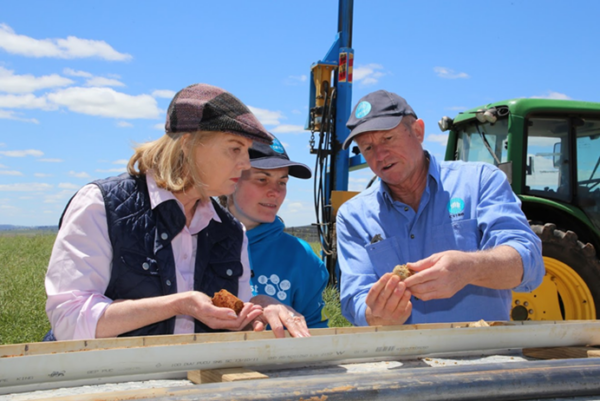Boorowa builds on Ginninderra’s research legacy
CSIRO’s Boorowa Agricultural Research Station opened in November 2019. In just three years, the facility has already made significant breakthroughs in crop science, agronomy and farming systems that build on CSIRO’s agricultural research legacy in NSW and the ACT.
Boorowa Agricultural Research Station (BARS) is a purpose-built 290 hectare facility in south west NSW that is helping develop Australian farms of the future. Agricultural research progressively transferred to BARS from the former Ginninderra Experiment Station, with the final agricultural research activities concluding at Ginninderra in June 2021.
BARS is continuing CSIRO’s long history in agricultural breeding and genetics, with hundreds of small plots dedicated to the development of new varieties of wheat, canola and grain legumes, as well as pastures. The facility also operates experiments on strategies such as nutrient management, crop and pasture sequences, and sowing times.

The Boorowa Agricultural Research Station has hundreds of small plots dedicated to crop research, continuing the legacy of the former Ginninderra Experiment Station.
The Boorowa Agricultural Research Station has hundreds of small plots dedicated to crop research, continuing the legacy of the former Ginninderra Experiment Station.
Some of the CSIRO technological innovations that have benefitted from research happening at BARS include:
- Chameleon water sensor – an accessible system for the world’s most vulnerable farmers that notifies them of their crops’ soil water levels, and helps them make decisions that significantly boost their crop yields.
- PhenoMobile – a machine to help analyse crops in the field and gather data about them to inform future breeding selection, genetic studies, and optimise farm revenue generation.
- WaterWise – sensor technology that allows growers to see in real time the water stress of their crop and predict their crops’ future water needs.
As well as enabling research into new farming technologies, BARS is also providing key insights into farm management practices. One area of innovative research at BARS involves managing and monitoring soil organic carbon.
Soil organic carbon is an important component of soil health and supports plant productivity and soil biodiversity. By better understanding soil carbon and how it cycles through the environment, production efficiency can be improved while reducing the net amount of carbon dioxide in the atmosphere.
Detailed soil analysis and mapping has been undertaken at BARS. This enables CSIRO to understand current levels of soil carbon, which areas of the facility are more vulnerable to loss, and possible management practices to capture the production and sustainability benefits.

Detailed soil analysis and mapping has been undertaken at the Boorowa Agricultural Research Station (BARS) to measure soil organic carbon levels.
Detailed soil analysis and mapping has been undertaken at the Boorowa Agricultural Research Station (BARS) to measure soil organic carbon levels.
Research at BARS is also enabling Australian growers to optimise their decision-making and planning through understanding and utilising their soil moisture. Understanding soil moisture helps farmers to forecast yield, forward-sell product, and assess the value of agricultural inputs. In addition, weather monitoring is enabling the development of new ways to put tailored insights about local weather and a changing climate into the hands of Australian farmers.
Data collected from across BARS is input into the Agronomeye AgTwin platform, an online tool that combines high-resolution maps of farming properties and advanced modelling techniques. It allows CSIRO researchers to observe the whole property and see data and insights about individual parts, variance across the site and how elements change over time.
These insights and monitoring from BARS are helping inform CSIRO research into precision agriculture which looks to develop and refine tools to assess, monitor and redress environmental and economic risks associated with agricultural practices. Precision agriculture seeks to exert more control over a production system by recognising variation and managing different areas of land differently, according to a range of economic and environmental goals.
The research at BARS is also enabling CSIRO to develop trusted solutions to help agribusinesses become sustainable as part of our HandPrint initiative.
BARS assists CSIRO to deliver on its commitment to increase food production in cropping and livestock systems, improve drought tolerance and disease resistance, and improve nutritional values to meet the challenges of the future.
BARS is an important education facility enabling knowledge sharing. Field days and VIP visits are an example of this, such as the visit by the Honourable Penelope Wensley AC, Australia’s National Soils Advocate to BARS in 2021 where CSIRO scientists discussed the collaborative Australian National Soil Information System (ANSIS) project led by CSIRO. The Australian Government funded ANSIS project will provide access to soil data and information needed to help sustainably manage Australia’s soils.

CSIRO scientists explain the new collaborative Australian National Soil Information System (ANSIS) project led by CSIRO to Australia’s National Soils Advocate, the Honourable Penelope Wensley AC, in 2021. Credit: Office of the National Soils Advocate.
